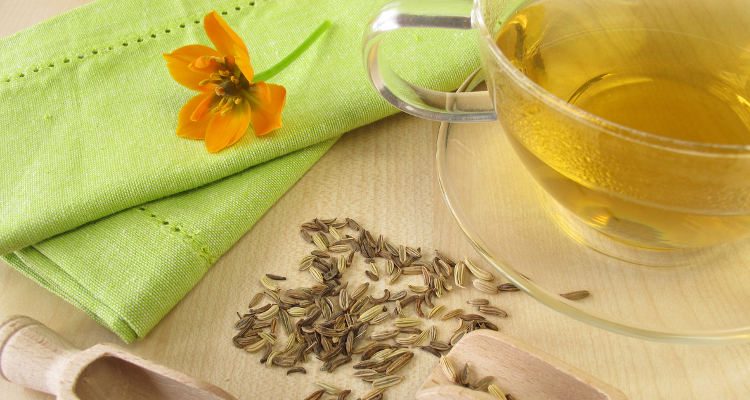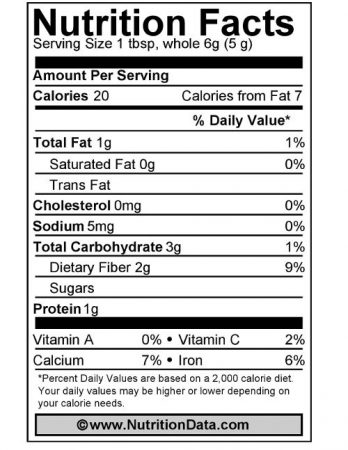
Fennel is a perennial herb that is popular for its culinary and medicinal uses. It is a highly aromatic herb that is native to Mediterranean shores. The fennel plant and its seeds have found their way to flavor beverages like tea, because of their fragrant smell and flavorful taste. It not only aromatizes your humble cup of tea, but benefits your health, too. The benefits of fennel tea include assisting digestion and maintening hormonal balance.
In countries like India and Pakistan, fennel seeds are commonly consumed as a mouth freshener. They are either eaten in their basic form, or sugar-coated in various colors. They are used as a spice in some Indian vegetable and bread recipes. In this article, we will discuss the benefits of fennel tea, as well as how to prepare it.
14 Benefits of Fennel Tea
The aroma and flavor of fennel seeds originate from their volatile oil components. These components in fennel are also linked with some notable health benefits. Here’s a list of 14 reasons why you should replace other herbal teas occasionally for the benefits of fennel tea.
1. Improves digestion
Fennel tea can aid in digestion due to the antispasmodic properties of fennel seeds. As a result, it can relax the gut system, and ease cramps and gas. It is also helpful in treating irritable bowel syndrome, and maintains digestive tract health by repairing damaged tissues.
2. Eases gastrointestinal issues
Fennel seeds have a reputation for treating heartburn. A cup of fennel tea will help you with indigestion, and ease any pain and burning sensation.
3. Reduces menstrual issues
Fennel seeds are composed of volatile oils that have the ability to stimulate the production of estrogen. As a result, fennel tea could be administered to soothe menstrual cramps, symptoms of PMS, and menopausal symptoms. The main component of fennel is anethole, which has mild estrogen-like qualities that can maintain hormonal balance. So, fennel tea can be used to treat hormonal problems and amenorrhea, as well as to stimulate the production of milk in lactating women.
4. Lowers blood pressure
Fennel tea benefits include normalizing blood pressure as well. Potassium is one of the nutrients found in the fennel herb. Potassium helps with blood pressure control by countering the effects of sodium, and excreting excess fluids and salts out of the body.
5. Protects the heart
Fennel tea benefits heart health, too. The presence of potassium in fennel seeds takes care of the heart. It acts as a vasodilator, relieving the tension on arteries and blood vessels. Thus, it can reduce the risk of atherosclerosis, heart attack and stroke, and prevent coronary heart disease.
6. Acts as an anti-inflammatory agent
Fennel tea can soothe joint pain and conditions of inflammation due to the presence of volatile oils that possess anti-inflammatory properties. Fennel tea can also help to detoxify the body and improve tissue and joint health, thereby relieving arthritic pain and gout.
7. Increases red blood cells
Drinking fennel tea can increase the count of red blood cells in the bloodstream. Iron and copper are two essential minerals that promote the production of red blood cells in the blood. Fennel seeds have a good quantity of iron as well as copper, and therefore, it can potentially increase red blood cell production.
8. Relieves respiratory distress
A cup of warm fennel tea benefits the respiratory system as it works as an expectorant. Fennel tea can be helpful in eliminating phlegm and mucus, and thus expel infectious pathogens that reside in them. Then anti-inflammatory properties of fennel tea help to soothe a sore throat and sinus pressure.
9. Relaxes eyes
Fennel tea can relax sore and puffy eyes due to its anti-inflammatory properties. It can be used to treat bacterial infections like conjunctivitis, since fennel seeds have antibacterial properties as well. Just dab a cotton ball in fennel tea, and gentle stroke the eyes with it.
10. Promotes dental health
Instead of drinking regular tea or coffee after a meal, have some fennel tea, as it can kill bad breath while helping with digestion. The antibacterial and antifungal properties can also take care of teeth and provide overall gum health.
11. Works as a colic remedy
Colic in infants can be treated with a traditional fennel tea remedy. One of the causes of colic in babies is gastrointestinal discomfort. Avoid feeding fennel tea directly to your infant. A breastfeeding mother can drink fennel tea, and it could reach the infant through breast milk. However, prior consultation with a pediatrician is highly recommended. Dill seeds boiled in water can also relieve stomach problems in babies.
12. Detoxifies the body
Fennel tea, with its beneficial herbal properties, promotes a healthy flow of urine. It can protect the liver from alcohol damage, and treat diseases like jaundice. Drinking fennel tea regularly may improve kidney health and function, and may also prevent the formation of kidney stones.
13. Aids weight loss
Drinking fennel tea for weight loss could be effective. Fennel tea is diuretic in nature, therefore it eliminates water retention through urination. Additionally, fennel tea can also boost your metabolism, and lead to burning of fat and calories. It also aids in digestion.
14. Builds immunity
Because of its antibacterial and antifungal properties, fennel tea can work against bacterial and fungal infections. It can help to build a healthy immune system, and prevent chronic infections like the common cold and cough.
Nutrition Content of Fennel Seeds
The fennel plant belongs to the parsley (Umbelliferae) family, a large family of herbs and spices. Other common members of the parsley family are caraway, dill, anise, and cumin. In addition to being an aromatic ingredient, fennel seeds have a good nutrition content, too. It is a healthy food ingredient as it low in sodium, cholesterol, and saturated fat. Fennel seeds are a wonderful source of potassium, copper, phosphorus, dietary fiber, calcium, iron, magnesium, and manganese.
Fennel seeds contain more minerals than vitamins. One tablespoon of fennel seeds contains 19% DV of manganese, seven percent DV of calcium, six percent DV each of iron and magnesium, three percent DV each of potassium, phosphorus, and copper, and one percent DV of zinc. The same amount of fennel seeds will also provide two percent DV each of vitamin C, thiamin, and niacin, and one percent DV of vitamin B6 and riboflavin. Fennel seeds also offer nine percent DV of dietary fiber, and thus, it is capable of improving digestion.
How to Make Fennel Tea
According to The George Mateljan Foundation for the World’s Healthiest Foods, fennel herb is quite rich in fiber, phytonutrients, and antioxidants that promote overall good health. You can always wrap up a long day with an aromatic cup of fennel tea. Reap all the fennel tea nutrition benefits with these simple recipes.
Fennel Seeds Tea Recipe
Ingredients:
- 3 teaspoons of fennel seeds
- Mortar and pestle
- 1 cup of boiling water
- Honey (optional)
Directions
Place a sauce pot over medium heat, and add some water in it. Bring it to boil.
In the mean time, put three tablespoon of fennel seeds in the mortar. Ground the seeds with the pestle into a fine powder.
Add a tablespoon or two of the powdered fennel seeds in a mug. Pour about one cup of hot water in the mug. Let it steep for seven to 10 minutes.
Stir in one tablespoon of honey and mix well. Drink warm.
Fresh Fennel Leaves Tea Recipe
Ingredients:
- 5-10 fresh fennel leaves
- 1 cup of water
- Honey (optional)
Directions
Pluck some fresh fennel leaves and clean them properly. Boil some water in a pot over medium heat.
Turn off the heat and put the leaves in the pot. Clover the pot with a lid. Allow the fennel leaves to steep for 15 to 20 minutes.
Pour the hot water through a mesh strainer into a mug. Add one tablespoon of honey and stir well. Enjoy it warm.
On a cautionary note, fennel tea should be avoided by pregnant women because fennel seeds contain certain compounds that are a possible uterine stimulant, and could cause complications. It is also advisable to consult with a physician before substituting or complementing medical treatments with fennel tea.
Related:
Sources:
“15 Fennel Tea Benefits And Who Must Not Consume,” CureJoy, February 28, 2017; http://www.curejoy.com/content/fennel-tea-benefits-and-who-must-not-consume/, last accessed March 24, 2017.
“11 Amazing Benefits Of Fennel Tea,” Organic Facts; https://www.organicfacts.net/health-benefits/beverage/fennel-tea.html, last accessed March 24, 2017.
“Infantile colic,” University of Maryland Medical Center, April 27, 2016; http://umm.edu/health/medical/altmed/condition/infantile-colic, last accessed March 24, 2017.
“Spices, fennel seed Nutrition Facts & Calories,” SELF NutritionData; http://nutritiondata.self.com/facts/spices-and-herbs/188/2, last accessed March 24, 2017.
Sajem, Y., “How to Make Fennel Tea,” LEAFtv; https://www.leaf.tv/articles/how-to-make-fennel-tea/, last accessed March 24, 2017.














